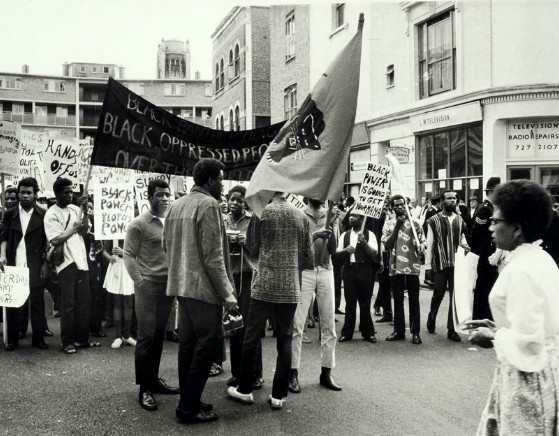What Many White People Do Not Understand About Equality.

{source}
“The old anti-slavery school says women must stand back and wait until the Negroes shall be recognized. But we say, if you will not give the whole loaf of suffrage to the entire people, give it to the most intelligent first. If intelligence, justice, and morality are to have precedence in the government, let the question of the woman be brought up first and that of the negro last.” ~ Susan B. Anthony
As I watched the movie Hidden Figures with a mixed audience of whites, blacks, Muslims, young, elderly, and others, I found myself wondering what white people would think of the film. I personally expected to be inspired, feel empowered, proud, and prepared for the tears that would fall seeing the movie’s depiction of the treatment of black women.
Yes, the white women portrayed in the film — and at that time in history — were also poorly treated. But a separate drinking fountain was not created just for them. They were paid more, and no one felt uncomfortable touching the coffee pot after they poured from it.
I wondered if white audiences would leave the theater satisfied at having their curiosity about this untold true story sated; celebrating the real-life characters’ happy endings; detached from the struggles and resilience of black people, two important themes at the crux of the story.
Most white people do sympathize with blacks who endured the Civil Rights era, and I don’t doubt that there were white audience members inspired by the film as well, appreciative of its historical black narrative.
And yet, I wondered whether white audiences would be able to translate that black narrative into current events in this country, or simply dismiss it as a thing of the past.
For the record, this is not an essay about the struggles of black people, or why our oppression is greater than [insert minority group here]. I am not playing Oppression Olympics.
What inspired me to write this piece were the markers I noticed throughout the film — how the black characters were looked down upon in shock and disgust when they entered non-colored spaces; the scene of the security guard who manhandled the sons of Dorothy Vaughan (played by Octavia Spencer) when they were kicked out of the library; the fact that data processors at NASA during that time were mostly black, and referred to as computers.
These were all important markers that made a critical point: black people were not seen as human.
Dr. Joy DeGruy authored a book and presentation called Post Traumatic Slave Syndrome, which addressed the residual impacts of trauma on African descendants in the Americas.
In her studies, Dr. DeGruy reported that black people were viewed as savages, and thus, not human, which made it okay for white people to snatch us from our lands, enslave us, work us to death (literally), separate us from our families, beat us, lynch us, jail us, rape us, impregnate us, starve us, experiment on us, and much more.
Similar to how Jews were treated during the Holocaust. Similar to how Palestinians are treated by the Israeli government today.
According to Dr. DeGruy, Post Traumatic Slave Syndrome affected everyone — blacks and whites. Internalized oppression made it difficult for blacks to trust whites, and the privileges of slave owners led white people to see themselves as superior.
This is the foundation of white supremacy — the belief that white people are superior in certain characteristics, traits, and attributes to people of other racial backgrounds, and that therefore, white people should politically, economically and socially rule non-white people.
This ingrained belief that white people are superior is still alive and well today.
It is apparent in the way black criminals are treated versus white criminals. It is apparent in the pay rate for white women ($0.82 to the dollar) compared to black women ($0.65 to the dollar). It is apparent in the privilege that affords white people access to better education, healthcare, professional advancement, etc. It is apparent in the way black men are portrayed in the media versus white men.
When we talk about equality in this country, my experience has been that many white people want to focus on how far we have come, to what could be, in an almost altruistic way that omits the icky part in the middle — white privilege. Emma Lindsay summed it up when she wrote, “equality is not your life now [white liberals], except with more POC friends.”
Equality in this country looks like the integration of different cultures, races, ethnicities, and religions, which would lead to the restructuring of our policies and values system.
Equality in this country demands that white supremacy be eradicated by using white privilege as a leverage to support blacks and other minorities, if not given up entirely.
Unity and inclusion is not the assimilation of minorities in to the world of white people. It looks like white (American culture) no longer being the standard. Many white people do not understand this. This is what white supremacists fear.
When black people say they want equality, we do not just mean equal pay, equal treatment, and equal employment. We want to be seen as equal, not inferior (and for those using the colorblind defense, please take this Implicit Bias Test on Race to see how colorblind you really are).
Black people want to be respected for our cultures and traditions, and not have them appropriated. We want to be heard and accepted, not accused of being angry. We want to matter, not be invalidated. Our movement has been around for centuries. Centuries. We did not just get woke with Trump’s election, we have been woke to the powers of white supremacists.
We have also been telling white people this for centuries. And so, when we insist, for example, that women of color be put at the center of a women’s march, there is a reason for it.
You will often hear black activists say that we do not want white allies, we want accomplices.
We need white people to be complicit in our movement to dismantle systemic and institutionalized racism.
As the popular t-shirt states, This Ain’t Yo Mama’s Civil Rights Movement. We are beyond reforms. This is a revolution.
We are revolting against white supremacy, and how this beast keeps us segregated. We are revolting against power-hungry politicians who take our rights away while claiming to represent us. We are revolting against oppression that keeps minorities at a disadvantage. We are revolting against the dehumanization of all others.
This is not an attack on white people. This is an attack on everything that undervalues, undermines, and delegitimizes black and brown people. When we are truly liberated from 21st-century-style slavery and oppression in the form of mass incarceration, poverty, profiling, murder by law enforcement, etc., only then can we truly be equal.
***
{Join us on Facebook, Twitter, Instagram & Pinterest}

